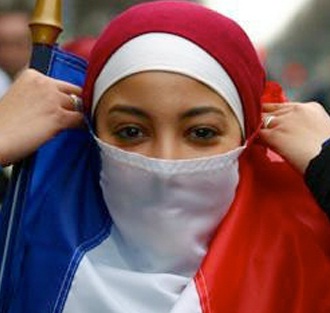
Oct 8 2010
A ban on the burka, and other full-face veils will take effect in France from next spring after an unexpected ruling by the country’s highest legal authority last night.
In a decision that will divide the country, and may spark fears of Islamic fundamentalist reprisals, the Conseil Constitutionnel removed the final legal obstacle to the ban, by ruling that a so-called “anti-burka” law passed by both houses of the French parliament did not infringe fundamental liberties.
The law, likely to take effect in six months’ time, makes it a criminal offence to “conceal one’s face in public”. The text makes no mention of Islam, or veils. It is, however, the direct result of a 15-month-long agitation by politicians, ranging from President Nicolas Sarkozy to the Communist mayor of a small town near Lyon, for a ban on the burka or its Arab equivalent, the niqab.
The Conseil Constitutionnel – the guardian of the French constitution – had been widely expected to object. Instead, it ruled that the law was a “reasonable balance” between personal liberty and the need to uphold other constitutional principles, such as women’s rights and public order. The so-called “sages” decided, however, that the ban must not apply in “places of worship open to the public”.
The timing of the ruling, at a moment when there have been repeated warnings of possible Islamist terrorist attacks in France and other European countries, may cause the French government some concern. Islamist fundamentalist websites have attacked the law – passed by the upper house of the French parliament last month – as an assault not just on full-face veils but on Islam itself.
Approval for the legislation, which has been widely criticised inside and outside France, also comes at a time when Mr Sarkozy is already under attack abroad for his campaign against Roma gypsy immigrants.
The Prime Minister, François Fillon, welcomed the ruling. He said the decision was “an important affirmation of the values” of the French Republic. The constitutional council had recognised, he said, that the government had a right to “impose minimum rules for social life as well as the principle of equality between men and women”.
The government is expected to promulgate the law in the next few days. There will be a period of six months of government information and education campaigns before the ban takes effect.
After that time, anyone wearing a full-face veil – or any face mask, with a few stated exceptions – could be fined ¤150 (£130) or sent on a “citizenship” course. Anyone “forcing” a woman to wear a full-face veil could be fined ¤30,000 (£26,000) or given a one-year jail sentence. Those who are exempt from the ban include motorcyclists, carnival revellers and sportspeople, such as fencers and skiers.
Another government watchdog, the Conseil d’Etat has twice stated that a ban on the burka from the streets and other public places would be constitutionally wrong. It recommended that the ban should apply only to public buildings, such as schools, hospitals and town halls. However, only the judgement of the Conseil Constitutionnel is binding.
The “sages” ruled last night that the law “respected the balance between public order and the guarantee of liberties and constitutional rights”. The legislation, as framed, “is not manifestly disproportionate to its aims… given the mild penalties imposed”, the judgement said.
The burka is traditionally an Afghan garment which consists of a full-body and head covering and allows the woman only a narrow gauze-covered eye-opening. It is rarely seen in France. The Arab equivalent, the niqab, which has a narrow opening at eye-level, is only slightly more common.
A study by the French internal security services last year suggested that the total number of women wearing both types of full-face veil in France was about 1,900, out of a total French population of adult Muslim women of about 1.5 million to 2 million.
The possibility of a “burka ban” was first raised last year by the Communist mayor of a small town near Lyon. He argued that it was important to hold the line against fundamentalist interpretations of Islam.
Mr Sarkozy at first appeared to reject the idea but then enthusiastically supported it. His shift has been identified by politicians on the left – and some within his own centre-right party – as the beginning of a more authoritarian period in his presidency, designed to appease voters on the hard right.
Prominent French people from Islamic backgrounds have complained that the debate has been driven from the beginning by political posturing rather than a desire to protect women’s rights or a genuine fear of extremist Islam.
The veil around Europe
Belgium became the first European country to restrict the wearing of Islamic garments when the lower house of parliament approved legislation outlawing clothing that hides a person’s identity in public places.
Spain has no plans for a national burka ban, but the city of Barcelona has already outlawed the wearing of full face veils in public spaces such as municipal offices or city libraries.
Holland threw out plans for a burka ban in 2006 but pressure for such a measure has been revived recently by the anti-Islam Freedom party, led by maverick politician Geert Wilders.






